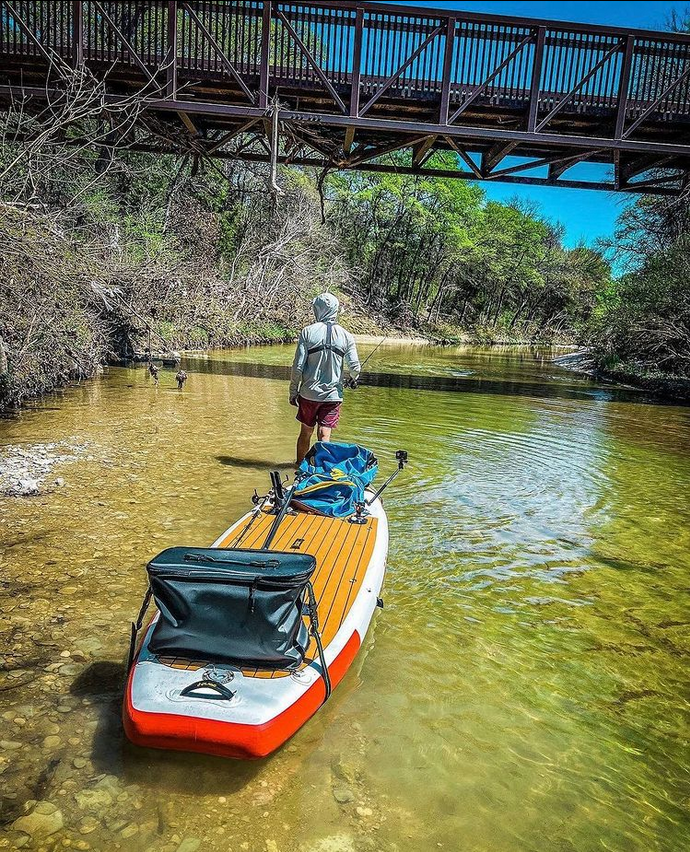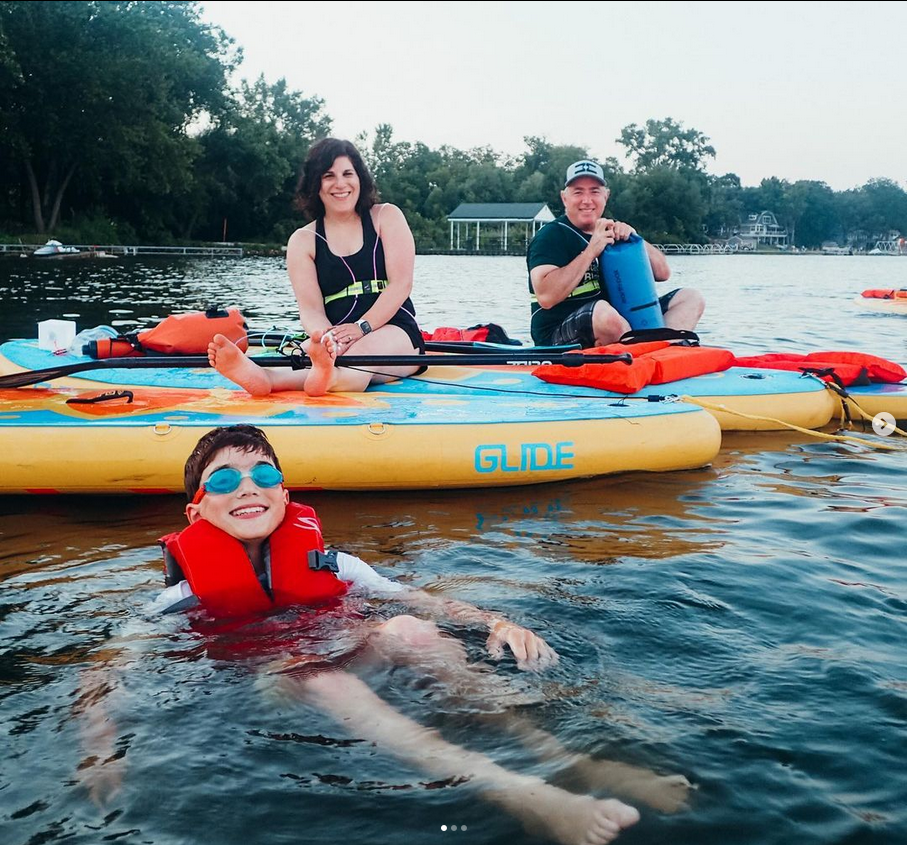
Inflatable paddle boards Q&A July 2022 Edition
We are starting a new feature on the Glide blog this week, get excited! It will be common questions and answers that our customer service gets during the week. For week 1 I am going to answer questions that were asked about inflatable paddle boards. Grab a drink and a snack and let's get into it!
Key Highlights:
- Versatility of Inflatable Paddle Boards: Ideal for a variety of activities except surfing.
- Durability Concerns Addressed: High-quality iSUPs are not prone to easy punctures, contrary to common myths.
- Selection Guide: Key factors in choosing the right inflatable paddle board include size, stability, and intended use.
- Comparison with Hard Boards: While both have unique advantages, iSUPs offer exceptional convenience.
- Maintenance and Longevity: Proper storage and care can extend the life of an inflatable paddle board significantly.
- Pet-Friendly Options: Features to consider if paddling with pets, ensuring safety and comfort.
Is it worth getting an inflatable paddle board?
Great question! And yes it is totally worth getting an inflatable paddle board with a few minor caveats. First off inflatable paddle boards are great for almost all types of paddling, all around, yoga, touring, flat water, and white water. The only thing they do not excel at is surfing, if you are going to be surfing a hard SUP is a better option.
Inflatable paddle boards offer a ton of great advantages over a hard board, they are easy to store, easy to transport, and with the woven drop stitch cores used on all Glide inflatable paddle boards, they perform as well as a hard board.
You do want to stay away from cheap inflatables as they are not durable, use a low-quality core, and are prone to issues after a month or so of use. For a more in-depth reading check out this article on Is an inflatable paddleboard worth it.

Do inflatable paddle boards puncture easily?
This is one of my favorites! And I totally understand the apprehension behind the question! I would not want to be out paddling around all happy then his something sharp and have my board turn into a flying carpet like on a cartoon.
But now, it is a myth that ISUP's puncture easy, well mostly a myth. Regardless of the brand of inflatable sup you are looking at as long as it is a quality board it will not puncture easily. All inflatable paddle boards except the very cheap ($200-$450) are made of at least 2 layers of PVC, this is what is marketed as "military grade" but a better term would be white water grade. This is the same PVC that is used in white water rafts, and as you know they are extremely durable, so the risk of getting a puncture in normal everyday use is almost non-existent. If you want to learn how inflatable paddle boards are made, click the link!
So do not be scared about the durability of your ISUP, you can drop it, hit rocks, and use it as a couch (take your fin out first!) and you are not going to damage your board. It is strong like bull.

How do I choose an inflatable paddle board?
Oh boy, this is a big one and a bit more than we can go into in the quick Q&A post. For your first inflatable paddle board, you are going to want an all-around shape board. These are the most common shapes you see when you think of paddle board, think giant longboard surfboard.
The advantage of an all-around SUP is that it that are very stable, fun to paddle, and allows you to try out all aspects of paddle boarding to see what is your favorite.
As you are looking and seeing all the different types of boards here is some very loose guidelines and what all the shapes mean.
A longer board is faster.
A wider board is more stable.
Typically longer boards are more narrow and less stable when they are not moving. They gain stability the faster they go.
A shorter board is typically wider. They are more stable while standing still, which is great for beginners, but they are slower.
Follow this link to learn more about how to choose your first inflatable paddle board.

Is hard sup better than an inflatable?
Hard sup's and inflatable sup's both have advantages and disadvantages, so there one is not better than the other. And as technology is getting more and more advanced inflatable sups are getting very close in performance to their hard board counterparts.
The advantage of a hard board is that is always ready to go, you just show up and toss it in the water and away you go. Hard boards also allow us to shape the board since it has a foam core. We can add concave, vee, pinch the rails etc etc etc, that you can not do on an inflatable board. This is extremely important when it comes to surfing your board. The hard board will always have the advantage when surfing and to a lesser degree racing.
Inflatable paddle boards are easy to store, easy to transport, and ready for whatever adventure you want to go on. Boards like our O2 Line which have woven drop stitch cores will be as stiff as a hard board, and the performance difference is extremely minimal if there even is one. So for all-around ease of use, I feel that inflatable boards are a great product to own. As always if you want to dig into hard sup vs inflatable sup click the link.
How long do inflatable paddle boards last?
As we touched on above inflatable paddle boards are very durable! A high-quality inflatable paddle board will last you many years and you may even be able to pass it down to your grandkids. We just don't know how long they will last as they have been on the market for just over a decade. As long as you store your board correctly and leave it out of the sun it will last you for many many years to come. And yes you can leave your paddle board inflated.
Will my dog pop my inflatable paddle board?
Unless your dog is actually chowing down on the board and you just let him/her go ham on it, no your dog will not pop your inflatable paddle board.
And same goes for their nails they will not pop your inflatable SUP. What can happen is if cujo has long nails and is very scared and gripping tight they can scuff up or scratch the deck pad on your board. The good news is that is a very simple repair, just put some Silicon II in the cracks and it will be as good as new!
Puppers love going on paddle boards, and by all means, you should take them with you! When you are looking for a board for your dog (or cat) you will want a board with a full-length deck pad. That will make it so so pup has something to grip, and is comfy on their paws. Most SUP's will not have a full-length deck pad and the deck PVC can be super slippery when it's wet and your pup will have a hard time standing, and could get hurt falling down. So please make sure to have a full-length deck pad when taking your dog with you. Learn more about teaching your dog to paddle board here.

Is paddle board good exercise?
Yes! Well it can be, like most exercise you get out of it what you put into it. If you take your board to the lake and use it as a floating dock while you take a nap on it, you probably are not going to get ripped. If you go out and do SUP sprints for an hour you will get an insane full-body workout that will leave you sore in muscles you did not even know you had!
A paddle board is a great way to get a full body workout that is a relatively low impact on your body. So what muscles do you use when paddle boarding? Great question smash the link as the kids say and learn all about it.
Conclusion
That is all the time I have for today, please keep the questions coming, and we will be happy to answer them! As always if you need more help, or have questions hit us up on chat, email or give us a call we are happy to help.


